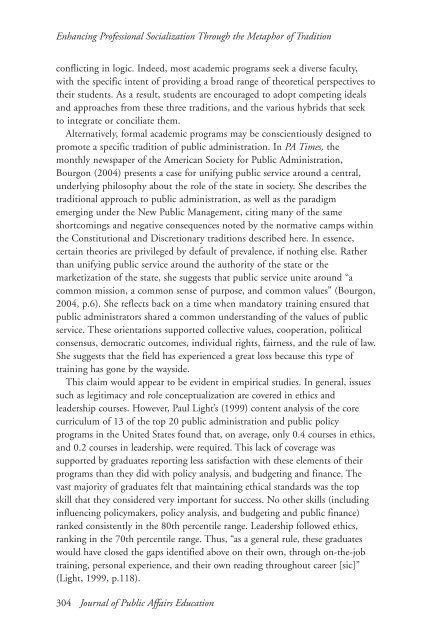journal of public affairs education - NASPAA *The Global Standard ...
journal of public affairs education - NASPAA *The Global Standard ...
journal of public affairs education - NASPAA *The Global Standard ...
- No tags were found...
Create successful ePaper yourself
Turn your PDF publications into a flip-book with our unique Google optimized e-Paper software.
Enhancing Pr<strong>of</strong>essional Socialization Through the Metaphor <strong>of</strong> Traditionconflicting in logic. Indeed, most academic programs seek a diverse faculty,with the specific intent <strong>of</strong> providing a broad range <strong>of</strong> theoretical perspectives totheir students. As a result, students are encouraged to adopt competing idealsand approaches from these three traditions, and the various hybrids that seekto integrate or conciliate them.Alternatively, formal academic programs may be conscientiously designed topromote a specific tradition <strong>of</strong> <strong>public</strong> administration. In PA Times, themonthly newspaper <strong>of</strong> the American Society for Public Administration,Bourgon (2004) presents a case for unifying <strong>public</strong> service around a central,underlying philosophy about the role <strong>of</strong> the state in society. She describes thetraditional approach to <strong>public</strong> administration, as well as the paradigmemerging under the New Public Management, citing many <strong>of</strong> the sameshortcomings and negative consequences noted by the normative camps withinthe Constitutional and Discretionary traditions described here. In essence,certain theories are privileged by default <strong>of</strong> prevalence, if nothing else. Ratherthan unifying <strong>public</strong> service around the authority <strong>of</strong> the state or themarketization <strong>of</strong> the state, she suggests that <strong>public</strong> service unite around “acommon mission, a common sense <strong>of</strong> purpose, and common values” (Bourgon,2004, p.6). She reflects back on a time when mandatory training ensured that<strong>public</strong> administrators shared a common understanding <strong>of</strong> the values <strong>of</strong> <strong>public</strong>service. These orientations supported collective values, cooperation, politicalconsensus, democratic outcomes, individual rights, fairness, and the rule <strong>of</strong> law.She suggests that the field has experienced a great loss because this type <strong>of</strong>training has gone by the wayside.This claim would appear to be evident in empirical studies. In general, issuessuch as legitimacy and role conceptualization are covered in ethics andleadership courses. However, Paul Light’s (1999) content analysis <strong>of</strong> the corecurriculum <strong>of</strong> 13 <strong>of</strong> the top 20 <strong>public</strong> administration and <strong>public</strong> policyprograms in the United States found that, on average, only 0.4 courses in ethics,and 0.2 courses in leadership, were required. This lack <strong>of</strong> coverage wassupported by graduates reporting less satisfaction with these elements <strong>of</strong> theirprograms than they did with policy analysis, and budgeting and finance. Thevast majority <strong>of</strong> graduates felt that maintaining ethical standards was the topskill that they considered very important for success. No other skills (includinginfluencing policymakers, policy analysis, and budgeting and <strong>public</strong> finance)ranked consistently in the 80th percentile range. Leadership followed ethics,ranking in the 70th percentile range. Thus, “as a general rule, these graduateswould have closed the gaps identified above on their own, through on-the-jobtraining, personal experience, and their own reading throughout career [sic]”(Light, 1999, p.118).304 Journal <strong>of</strong> Public Affairs Education
















